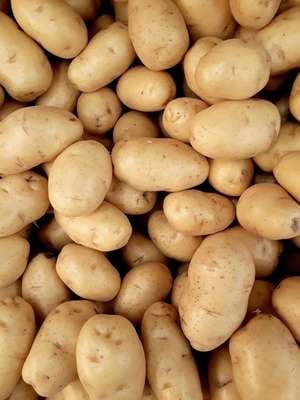Higher prices, more food waste: Farmers raise concerns over impractical standards for one vegetable
By
Danielle F.
- Replies 42
Australians take pride in the quality of their produce, and it's no secret that spuds are one of the most enjoyed vegetables in Aussie homes.
Whether it's a creamy mash, crispy chips, or a classic salad, potatoes have been a diet staple ever since.
However, the quest for the perfect potato has been a growing concern, which has led to farmers clamouring for change.
At a recent South Australian parliamentary hearing, the spotlight was on the high aesthetic standards for potatoes and its impact on both the industry and consumers.
Growers and farmers spoke out, saying that these expectations are causing more food waste but also contributing to higher prices at the checkout.
Terry Buckley, a major potato grower from South Australia, presented his concerns to the state's Select Committee.
'We have the highest standard of French fries, crisps and fresh potatoes in the world,' Mr Buckley stated.
However, he also highlighted the downside: 'There's obviously a lot of wastage in trying to achieve those high standards.'
In Europe and the United States, consumers are accustomed to potatoes that may not look perfect due to storage.
Yet, these consumers focus more on the taste and texture.
Mr Buckley believed that Australian supermarkets and consumers need to look beyond the surface—especially since the skin is often peeled away before consumption.
The current standards mean that potatoes that do not meet supermarket criteria are typically relegated to stock feed.
To avoid possible defects, farmers are forced to harvest potatoes earlier, which could affect the quality and taste of the crop.
Robert Simms, the select committee chair and Greens MLC, called the focus on potato appearance 'absurd', especially during a cost-of-living crisis.
'Potatoes are a staple food. It's cheap and filling,' Mr Simms stated.
'If you're someone who's trying to put food on the table for your family, getting access to cheap potatoes is a really good way to do that,' he added.
The committee also heard from supermarkets about their aesthetic standards for other products.
Woolworths mentioned that there isn't a consumer desire for large bananas.
This, in turn, leads to discarding good produce.
After Mr Buckley raised his concerns, the SA Select Committee into Supermarket Pricing should deliver their recommendations to address this issue by the end of the year.
These recommendations should address the gaps and propose changes that could benefit everyone involved.
So, next time you're at the supermarket, take a moment to consider the potatoes you're buying.
Remember that the odd shapes and sizes are just as delicious, and buying them can help reduce food waste and keep prices down.

Have you noticed the high standards for potatoes and other produce at your local supermarket? Would you be willing to buy less-than-perfect potatoes if it meant saving money and reducing waste? Share your thoughts and experiences in the comments below.
Whether it's a creamy mash, crispy chips, or a classic salad, potatoes have been a diet staple ever since.
However, the quest for the perfect potato has been a growing concern, which has led to farmers clamouring for change.
At a recent South Australian parliamentary hearing, the spotlight was on the high aesthetic standards for potatoes and its impact on both the industry and consumers.
Growers and farmers spoke out, saying that these expectations are causing more food waste but also contributing to higher prices at the checkout.
Terry Buckley, a major potato grower from South Australia, presented his concerns to the state's Select Committee.
'We have the highest standard of French fries, crisps and fresh potatoes in the world,' Mr Buckley stated.
However, he also highlighted the downside: 'There's obviously a lot of wastage in trying to achieve those high standards.'
In Europe and the United States, consumers are accustomed to potatoes that may not look perfect due to storage.
Yet, these consumers focus more on the taste and texture.
Mr Buckley believed that Australian supermarkets and consumers need to look beyond the surface—especially since the skin is often peeled away before consumption.
The current standards mean that potatoes that do not meet supermarket criteria are typically relegated to stock feed.
To avoid possible defects, farmers are forced to harvest potatoes earlier, which could affect the quality and taste of the crop.
Robert Simms, the select committee chair and Greens MLC, called the focus on potato appearance 'absurd', especially during a cost-of-living crisis.
'Potatoes are a staple food. It's cheap and filling,' Mr Simms stated.
'If you're someone who's trying to put food on the table for your family, getting access to cheap potatoes is a really good way to do that,' he added.
The committee also heard from supermarkets about their aesthetic standards for other products.
Woolworths mentioned that there isn't a consumer desire for large bananas.
This, in turn, leads to discarding good produce.
After Mr Buckley raised his concerns, the SA Select Committee into Supermarket Pricing should deliver their recommendations to address this issue by the end of the year.
These recommendations should address the gaps and propose changes that could benefit everyone involved.
So, next time you're at the supermarket, take a moment to consider the potatoes you're buying.
Remember that the odd shapes and sizes are just as delicious, and buying them can help reduce food waste and keep prices down.
Key Takeaways
- Australian farmers expressed their concerns over the high aesthetic standards for potatoes, causing food waste and higher prices.
- Terry Buckley, a major potato grower, stated that the country has become too focused on the appearance of potatoes rather than their taste.
- The SA Select Committee into Supermarket Pricing started investigating the matter and is expected to deliver recommendations by the end of the year.
- The committee chair criticised the emphasis on appearance for leading to absurd levels of waste and higher costs for consumers, especially when facing a cost-of-living crisis.








